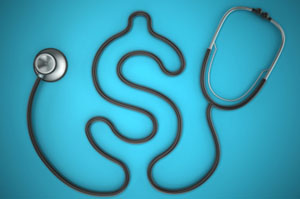- Home
- News
- Features
- Topics
- Labor
- Management
- Opinions/Blogs
- Tools & Resources
Mixed Messages On Direction Of Health Care Spending
By JORDAN RAU, KHN— Two new studies assert that the country’s unusual slowdown in health care spending growth rates may be due more to structural changes in the health care system than to the lagging economy, and could continue even after business picks up.
National health care spending grew by 3.9% a year between 2009 and 2011, the lowest rate of increase in half a century.
There has been a vigorous debate about whether this slowdown portends a new era of lesser health care inflation or is merely a brief dip caused by the recession.
The new studies, published May 5, 2013, by the journal Health Affairs, are optimistic that the change is permanent, though neither study can pinpoint what factors exactly are responsible.
The first study examined to what degree job loss and insurance benefits were responsible for restraining health care spending.
In examining claims of 10 million employees at 150 large companies between 2007 and 2011, the researchers determined that spending rates on medical services by the employed, which had been accelerating at 5% before the recession, plummeted in 2010 to less than 2%.
That was a deeper decrease than appeared in previously released national statistics that included the unemployed and those receiving public insurance.
The spending by employees of the big companies accelerated in 2011 to slightly more than 2%, but it has not rebounded to the level it was before the recession.
The researchers estimated that rising out-of-pocket costs for employees due to higher cost sharing in their insurance plan designs accounted for about 20% of the spending slowdown.
But they concluded the slowdown persisted even when the influence of larger out-of-pocket costs were put aside.
“We believe that current trends support cautious optimism that the spending slowdown may persist,” wrote the team of Harvard Medical School researchers, which included professor Michael Chernew and student Alexander Ryu.
The second study, by Harvard economists David Cutler and Nikhil Sahni, found that national health spending between 2003 and 2012 ended up being $514 billion, or 16%, below the level predicted by government actuaries at the Centers for Medicare & Medicaid Services.
The researchers concluded that only 45% of the slowdown could be attributed to three factors: the recession during 2007 through 2009, a drop in coverage from private insurance and the government’s Medicare payment cuts.
“The slowdown pre- and postdates the recession and shows up in populations whose medical care use is normally unaffected by economic cycles, such as the elderly,” they wrote.
They posited that the remaining 55% of the health care spending slowdown was due to “a host of structural changes—including less rapid development of imaging technology and new pharmaceuticals, increased patient cost sharing, and greater provider efficiency.”
If the trends continue during the next decade, they said public sector health care spending could be as much as $770 billion less than predicted.
Differing Views On The Direction Of Health Care Spending
Dr. Kavita Patel, a policy expert at the Brookings’ Engleberg Center for Health Reform, cautioned against letting these studies lull people into complacency about the need to keep cracking down on health care spending costs.
“I am concerned with having some kind of declarative statement that we no longer have to worry about cost growth, even though I know the authors aren’t trying to say that,” she said. “This is just one more data point that we’re doing something in the right direction, but we shouldn’t say that’s enough.”
The conclusions of the Harvard studies differ from what researchers at the Kaiser Family Foundation, Temple University’s business school and the Altarum Institute’s Center for Sustainable Health Spending forecast in a study released last month.
KHN is an editorially independent program of the foundation.
Their study looked at national health care spending between 1965 and 2011, and determined that inflation and growth in the economy explained 85% of the variation in health spending during those decades.
They estimated that economic factors were responsible for 77% of the recent decline in health spending, and therefore likely to be temporary.
“Increases in health expenditures are likely to trend upwards over the coming decade as the economy returns to a more normal rate of growth,” they wrote. “Sustaining low growth rates in health spending will require continued pressure for containing costs throughout the system.”
Another report, issued just minutes before the Health Affairs studies were released to the public, also disputed the notion that the slowdown will be permanent.
“On this front, history is not encouraging,” wrote John Holahan and Stacey McMorrow, researchers at the Urban Institute, in the paper released by the Robert Wood Johnson Foundation. “Health spending growth has rebounded after every major attempt at cost containment and this creates understandable skepticism that the most recent slowdown will be lasting.”
Subscribe to WWOW’s post by email:
[subscribe2]
List your business in the premium web directory for free This website is listed under Human Resources Directory





